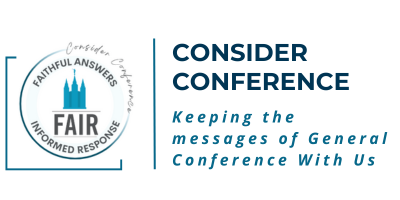
In a world that seems to thrive on contention and division, it‚Äôs natural to wonder: How can I hold onto light in the midst of it all? Elder Ronald A. Rasband‚Äôs talk, ‚ÄúBehold I Am the Light Which Ye Shall Hold Up,‚ÄĚ invites us to do just that‚ÄĒfind, hold, and share the light of the Savior. His message calls on us to strengthen our commitment to Jesus Christ by sustaining our leaders and lifting each other. But what does ‚Äúholding up‚ÄĚ the light really mean? And how do we fulfill this call in today‚Äôs complex world?
Elder Rasband’s talk offers a clear apostolic witness of Jesus Christ as the Light of the world and reaffirms the sacred role of prophets in guiding us through spiritual challenges. He emphasizes that sustaining leaders isn’t passive; it’s a call to action. By holding up those called to lead, we strengthen our own resolve and align ourselves with divine purposes. Elder Rasband’s counsel is especially relevant for those facing questions about the role of modern prophets, the fallibility of leaders, and how best to support others in a world often skeptical of faith.
Common Questions, Misconceptions, and Criticisms
Doctrine
- Why should we sustain modern prophets when they’re just men and fallible?
- Response: Sustaining prophets isn‚Äôt about believing they‚Äôre perfect but rather that they are called by God despite their human imperfections. From Moses to Peter, scripture provides examples of how the Lord works through His chosen leaders to accomplish His purposes. Elder Rasband reminds us that by supporting modern prophets, we are trusting in God‚Äôs choice and showing our faith that He guides His Church through them. As Amos 3:7 says, ‚ÄúSurely the Lord God will do nothing, but he revealeth his secret unto his servants the prophets.‚ÄĚ
- Common Fallacies: This criticism often relies on a genetic fallacy by dismissing leaders based on their humanity, not their divine calling. It assumes that if a prophet is fallible, his guidance is invalid‚ÄĒan assumption that ignores the scriptural precedent of God using imperfect people to achieve His perfect work. (Read more about genetic fallacy here)
- Why is it necessary to support leaders when we could follow Christ directly?
- Response: Supporting our leaders and following Christ aren‚Äôt mutually exclusive‚ÄĒthey complement each other. Elder Rasband teaches that by sustaining the prophet, we are choosing to align ourselves with Christ‚Äôs teachings and receiving His counsel through those He has chosen. Doctrine and Covenants 1:38 reinforces this truth: ‚ÄúWhether by mine own voice or by the voice of my servants, it is the same.‚ÄĚ In following inspired leaders, we strengthen our commitment to Christ.
- Common Fallacies: This critique often presents a false dichotomy by suggesting that we must choose between following Christ or sustaining our leaders. However, sustaining leaders is a direct expression of following Christ, as we follow the order He established for His Church.
History
- Aren’t ancient prophets like Moses more significant than modern leaders?
- Response: Elder Rasband uses examples like Moses to illustrate continuity in the Lord‚Äôs pattern. Modern prophets, like their ancient counterparts, are divinely appointed to lead us. The Lord doesn‚Äôt place temporal limits on the importance of His servants‚ÄĒHe calls prophets in every age to serve the needs of their time. As Elder Rasband states, we hold up the prophet to benefit from his experience, revelation, and guidance specifically tailored to today‚Äôs spiritual and moral challenges.
- Common Fallacies: This critique stems from the appeal to antiquity fallacy, suggesting that earlier leaders are inherently more authoritative because of their time period. However, the Lord’s pattern of revelation remains consistent, underscoring the timeless importance of prophetic leadership.
Social Issues
- Doesn’t focusing on sustaining leaders encourage blind obedience?
- Response: Elder Rasband clarifies that sustaining leaders involves active engagement, not passive acceptance. To ‚Äúhold up‚ÄĚ our leaders is to thoughtfully consider, pray about, and act on their teachings. This isn‚Äôt blind obedience‚ÄĒit‚Äôs a way to exercise our own faith and receive spiritual growth. By studying their counsel, seeking personal revelation, and applying their teachings, we show both loyalty to the Savior and personal integrity.
- Common Fallacies: This criticism involves a straw man fallacy by mischaracterizing sustaining leaders as unthinking compliance. The doctrine of sustaining leaders encourages thoughtful discipleship and personal revelation, not passive acceptance.

Defending Divine Doctrines
Doctrinal Emphasis:
Elder Rasband‚Äôs message aligns with key doctrines that support the Church‚Äôs teachings on the role of prophets. His talk reinforces that modern prophets are called to guide us through present challenges and provide inspired counsel. Doctrine and Covenants 1:38 powerfully supports this: ‚ÄúWhether by mine own voice or by the voice of my servants, it is the same.‚ÄĚ Such teachings are central to the Church‚Äôs understanding of prophetic authority and serve as a clear defense against criticisms of human fallibility.
Application:
By understanding that the Lord works through His servants, we can see the bigger picture of His guidance in our lives. The Plan of Salvation itself shows us that the Lord gives us inspired leaders to keep us on course. Elder Rasband’s emphasis on sustaining leaders invites us to remember that the Savior’s light is carried forward through prophets, just as it was anciently. This continuity adds depth to our understanding of how we each play a role in supporting God’s work on earth.
Historical and Doctrinal Connections
Contextual Background
In referencing leaders like Moses, Elder Rasband draws a connection between ancient and modern-day servants of the Lord. Just as Moses led the children of Israel through a time of great trial, modern prophets guide us through today’s unique challenges. This connection demonstrates that the Lord’s method of calling prophets has not changed, reinforcing the Church’s doctrine of continuing revelation.
Resources for Deeper Understanding
For those interested in exploring the role of prophets further, consider reading the FAIR article, ‚ÄúTrusting Imperfect Prophets‚ÄĚ This resource provides a more in-depth look at how prophets have served as the Lord‚Äôs spokespeople throughout history and continue to do so today.

Living Apologetics
Practical Application
Elder Rasband‚Äôs counsel provides us with several ways to put ‚ÄúLiving Apologetics‚ÄĚ into practice:
- Strengthen Your Family: Start by sustaining those closest to you. Elder Rasband reminds us that we hold up our spouses, children, and friends. Show them your love by being present, offering support, and sharing your testimony with them.
- Engage in Respectful Dialogue: As you uphold the prophet‚Äôs teachings, be prepared to discuss them with others. Consider using a ‚ÄúRespectful Dialogue Guide,‚ÄĚ where you listen actively, avoid contentious language, and share your beliefs with love and understanding.
- Serve in Your Community: Living apologetics means representing the Savior’s teachings through action. Look for ways to serve those in your community, showing by example the importance of loving and lifting others.
Faith in Action
Consider the example of members in your ward who volunteer in the community or serve their neighbors regardless of their faith. Their actions reflect Christ’s light and show others the power of sustaining and lifting each other.
Quick Reference: Key Defenses and Facts
Defensive Highlights:
- The Role of Prophets: Prophets are called to guide us in our specific time and circumstances, continuing the pattern set by God throughout history.
- Sustaining Leaders Is Active, Not Passive: To sustain leaders is to thoughtfully engage with their teachings and incorporate them into our lives. Praying for our leaders is another way we can sustain them.
- Holding Up Christ’s Light: By sustaining our leaders, we are participating in the Lord’s work to bring light into the world, just as He commanded in Matthew 5:16.
Top Apologetic Facts:
- Doctrine and Covenants 1:38: The Lord affirms that the words of His servants are as His own, providing a clear basis for modern-day revelation.
- Historical Continuity: The calling of prophets is a timeless principle, seen from Old Testament figures to today’s leaders.
Conclusion
Encouragement and Reflection:
As we hold up the Savior’s light, we become a source of strength for others, reflecting His love and purpose. Elder Rasband’s talk invites each of us to support our leaders, lift those around us, and embrace our role in the Lord’s work. How will you hold up the light in your own life? Consider exploring more FAIR articles on related topics to deepen your understanding and strengthen your commitment.

Share your insight
Your thoughts and experiences can help others along their journey. Share them below, and let’s continue this conversation on sustaining the Savior’s light together.
The Consider Conference series by FAIR offers an in-depth look at recent General Conference talks to help members of the Church of Jesus Christ of Latter-day Saints navigate common questions, misunderstandings, and criticisms. Each post provides doctrinal insights, historical context, and practical ways to apply gospel principles in everyday conversations. Through this series, we hope to equip readers with faith-promoting resources that encourage thoughtful reflection, respectful dialogue, and a stronger foundation in gospel truths, fostering both personal conviction and meaningful discussions with others.
The post Holding Up the Light of Christ: Sustaining Leaders and Each Other appeared first on FAIR.
Continue reading at the original source ‚Üí



